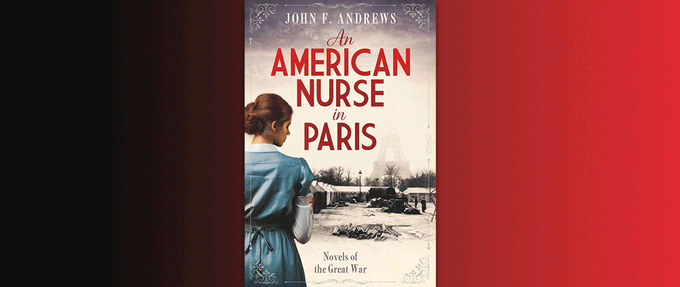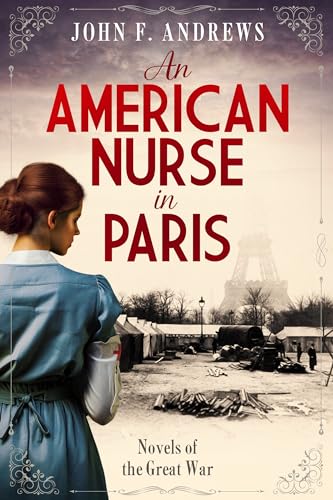The Battle of Belleau Wood was a historic battle fought towards the end of World War I. One of many battles constituting the German spring offensive along the Western Front, the conflict involved the U.S. 2nd and 3rd Divisions as well as French and British troops. The battle has since become a major component of U.S Marine Corps history, recognized not only for its significant victory for Allied forces, but for its brutality and loss.
An American Nurse in Paris serves to not only honor the Marines and soldiers who fought in the battle, but to recognize those working behind the scenes—the American women who went to France during the war. These women, working as nurses, often experienced misogyny, with Medical journalist Alice Simmons in Andrews’ novel undergoing such treatment and worse.
Alice travels to Paris in 1918 to work as a war correspondent, but is swiftly met by a blockade of sexism. The officer in charge of the American Army press office refuses to let Alice travel to the Front and document the German spring offensive in full swing. But one night, everything changes as the officer’s cruelty mounts into an attempted assault.
Although Alice manages to fight off his advances, he begins a widespread smear campaign to save his image. So, when a nursing position opens in an American Red Cross military hospital, Alice takes the job, viewing it as her last hope to stay in France. But it turns out to be the best decision she could have ever made—helping others and opening her heart to love.
For a sneak peek at this profound novel, read the excerpt below, then download the book today.
Chapter 1
Friday, May 24, 1918
Paris, France
Alice Simmons
They don’t need to paint a target on me. I wear a skirt. The only one in the American press corps in France.
This straight-backed wooden chair has tormented me since my arrival at twelve thirty for my meeting at one. It’s three thirty.
My bladder is making me regret the extra cup of coffee I had for lunch.
I still my restless right leg. This waiting room is a cubbyhole—hot, humid, and redolent with fumes from the chinless, chain-smoking private sitting behind a metal desk. Germany will have nothing to fear if all the clerks type with one index finger like this fool.
Snick . . .
This is so typical of things since I arrived in Paris. Six male journalists have come and gone since I sat down in this accursed chair. One gave me the familiar smile usually reserved for fashion columnists—the only reporting job most of them think women are suited for. The others ignored me as they passed through. All of them went straight in.
Everything I’ve done since I arrived in Paris boils down to this one meeting. I was scheduled to meet Colonel McCabe. When I arrived, the one-finger-typing private told me McCabe is out of town. My meeting is now with Major Richard Martel, whom I’ve never met. They don’t invite me to the routine briefings he gives the other reporters.
This won’t make me give up. I’ve come too far to quit.
So, this is it—I’ll be off to report on the war if this meeting goes well. If not, I might as well hop on the next ship and head back to the States.
Pure professionalism dictated my attire for the day—tan blouse under a dark brown jacket and a summer-weight woolen skirt. The hemline is longer than the mid-calf ones many of the women in Paris wear. I decided to not play an intimidation game with my height, so on went the tan flats. Hell, I’m taller than half the men here and eye to eye with most of the rest. No makeup, of course, and hair in a modest bun—tight ones make the angles of my face look too severe.
I push my glasses up. Damn things—been with me since I was a kid. The good thing is that they make my oddball eye color less obvious. I call them hazel, but there are bits of green and blue. It’s as if my parents’ genes couldn’t make up their minds and compromised on . . . whatever color you want to call them. Today they’re hazel. Tomorrow? Maybe greenish.
Someone with less self-respect would doll herself up with makeup, mascara, a little perfume here, and, perhaps, one button less. A touch of elegance? I’d only be kidding myself if I tried. In high school, the homecoming queen wished me a successful career as a librarian as I sat, reading, in a corner by myself during prom. That’s who Alice Simmons is—who I am. I don’t mind it. Much.
Truth is—it gets lonely. I can only count two close friends in this world. One is in an office a floor below me—Ira Cunningham. The other, his daughter Trudy, is on her way here to work as a nurse. I’ve got to see Ira after I’m done here. If I’m ever done. If Major Martel will even see me.
“Private?” I ask.
“Lady, you blind or what? Can’tcha see I’m workin’? Count yaself lucky Major Martel’ll see you at all.” He slaps the carriage return with a ding.
The back door opens. A reporter I don’t recognize emerges wearing an expression like he’s just eaten an unpeeled lemon. The phone rings on the clerk’s desk. He speaks quietly, with a sidelong glance toward me. “Yessir, she’s still here.” He hangs up. “Simon. Front and center. Major Martel’ll see ya. Got two minutes. Make it snappy.”
“It’s Simmons. Miss Alice Simmons.”
The clerk leads me down the hallway and knocks on a closed door.
“Come,” says a resonant baritone. The clerk stands in the doorway, leaving just enough room for me to shimmy through sideways. The door clicks behind me. A dribble of sweat trickles down my right side.
Major Martel could have starred in the movies. The term “matinee idol” had been just a whisper before the war, but he fits. Mid-to-late thirties? Brilliantined black hair swept back, wisps of gray at the temples, brooding brows over coal-black eyes, with a pencil mustache above a chiseled chin. I’m not sure about his cologne, but it’s not cheap. A partially smoked cigar rests in his cut crystal ashtray. A small silver bifold picture frame lies closed next to a Montblanc fountain pen set. My father has the same set.
Major Martel’s eyes flash over me. The quick assessment of an experienced army officer or something else? I pull the lapels of my coat closer before thinking. He spreads his hands, palms up. “Alice, I’m so sorry to make you wait. This is a very busy afternoon. What can I do for you, sweetheart?” Martel’s accent flows like Louisiana molasses.
An apology?
Sweetheart?
He doesn’t motion me to sit. “I came to request a pass to permit me to report outside Paris. I’ve written all the stories I can find here. I’m a medical reporter. As far as I know, the only reporter with a medical background here. I trained as a nurse while getting my journalism degree and offer a unique perspective to the folks back home. And I speak fluent French. My problem is that the French won’t let me in their Paris hospitals, and all of ours are outside the city. Now, I’m not asking to go anywhere near the fighting, just to the base hospitals, to report on the human side of the medical effort here.”
Martel frowns and rubs his hands. No wedding band, but a large golden class ring adorns his right. “Our French amis will never approve a laissez-passer for a non-accredited reporter.”
“Sir, reporters who arrived after me have been going to those places without accreditation. I’ve served my time here in Paris, been responsible. All my articles comply with your censorship rules. The French have relaxed their earlier restrictions, according to the others.” I smile, straightening my shoulders an inch. For all the bad things I’ve heard about the man, he seems to be listening to me. The flattering glint in his eyes is astonishing. Men don’t look at me this way. It’s unsettling, and something else—alluring? He’s also the most handsome man I’ve ever met.
“Alice, I regret to inform you that there is simply no opportunity for you to work outside Paris. To go farther afield would be excessively hazardous for a gentle lady like yourself. Current circumstances and the French leave me no choice but to deny your request. Now, mind you, this isn’t from me—it comes from on high.” He gazes up toward the ceiling as if he gets his orders from God.
“Sir, if I may, I’d like to explain my proposal further—”
“As you can see . . . I’m a very busy man. But I’d like to hear more—under less formal circumstances . . .” The glint reappears.
My ears are on fire. Is he asking for a date? Is this a genuine offer, or just a come-on? Does he care about me, or is he just looking for female companionship? “I’m not sure I understand.”
“Well, it’s fairly simple, my dear. I’m usually free in the evenings around suppertime. Perhaps . . .” His gaze drifts down to my chest and lingers as though weighing my breasts.
I push the glasses up. “Major, I . . . I . . .” I’m dumbstruck. His eyes trickle down to the space between my legs, as though seeing through my skirt. I shift an inch to my left.
A frown gathers on Martel’s face, and his eyes cloud. “Alice, I’m sorry, but if there’s nothing else, I must get back to my other duties.”
“If only you’ll reconsider . . .”
“Consider this, Alice.” Martel stands and walks around me. I hear the door open. Martel stands beside the doorframe. He cups my left shoulder. “I’m much more . . . attentive . . . after work hours. Your cause may not be lost.” A friendly smile grows on his face. A warning rattles underneath my schoolgirl blush.
Want to keep reading? Download An American Nurse in Paris today!
Featured image: Nok Werner / Canva

